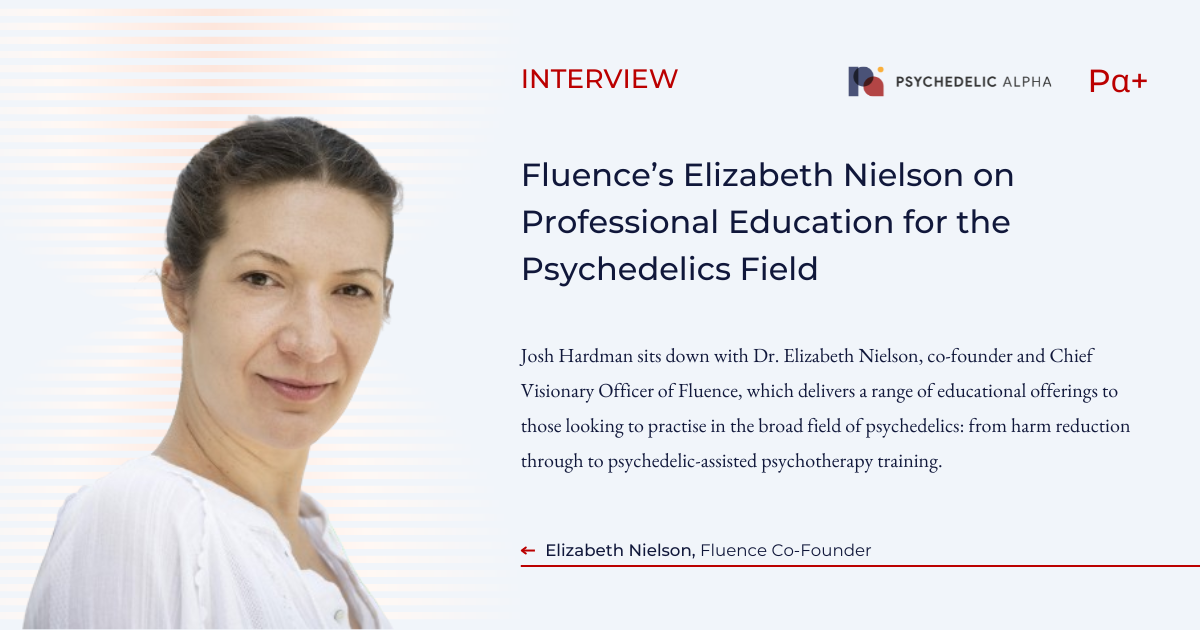As the first psychedelic-assisted therapies head towards potential regulatory approvals, we’re becoming increasingly focused on the challenges that drug developers, providers and patients may face in rolling out and accessing these treatments at scale.
One such challenge will be the availability of an appropriately trained and adequately incentivised pool of providers (which might be called therapists, facilitators, mentors, or any other number of things), which will have a significant impact on the scalability and success of these treatments.
In our latest Pα+ interview, Josh sits down with Dr. Elizabeth Nielson, co-founder and Chief Visionary Officer of Fluence, which delivers a range of educational offerings to those looking to practise in the broad field of psychedelics: from harm reduction through to psychedelic-assisted psychotherapy training. Fluence has delivered education to more than seven thousand people, putting it at the forefront of efforts to upskill a new generation of psychedelic sitters.
Here, we discuss a range of topics, from Nielson’s entry into the field through to the various types of extra-pharmacological models employed in psychedelic studies and whether psychedelic therapists should have their own psychedelic experiences.
***
Josh Hardman, Founder & Editor, Psychedelic Alpha: So, as is customary: how did you become involved in psychedelics, and what led you to start Fluence?
Elizabeth Nielson, Co-Founder, Fluence: My background is in clinical psychology, I’m a licensed psychologist in the State of New York. I had an interest in addiction psychology and the improvement of addiction treatments initially, and in 2014 I got involved with the study of psilocybin for alcohol use disorder at NYU as a study therapist.
I quickly started getting involved with other things that were going on in the field and eventually did training with MAPS and became a site co-principal investigator on their phase 3 trial, also in New York City. I then went on to work at New York State Psychiatric Institute on the Compass Pathways-sponsored phase 2b study of psilocybin for treatment-resistant depression.
Along the way I noticed that there was a gap, a need to be filled training both clinicians working in the community and clinicians that were going to work on psychedelic clinical research trials. Ingmar Gorman and I formed Fluence in 2019 to address this gap. We began providing training to therapists in the community and working with drug developers. We started our first major project in drug development in 2021 with Beckley Psytech.
Hardman: So what does working with drug developers look like as we prepare for the potential approval of a psychedelic drug product, such as MDMA-assisted therapy? How are you looking at that, and how can you prepare for that? Because I know that at least on the sponsor’s behalf, it’s difficult for them to be seen to be doing too much before approval. So it’s kind of a delicate chicken and egg situation, right?
Nielson: It’s a delicate situation and I think there’s a lot of complexities that many folks who aren’t in these conversations might not be aware of.
We always want to be training people for things that they can do within their scope of practise, either as a licenced provider in the community or on a research study where there’s an avenue to use that skill set. That’s been one of our guiding principles since we started, which is why you won’t see us offering training in modalities where there isn’t a clear pathway to use.
When we’re talking about research studies, it’s great because you can train people on a wider variety of things within those contexts and start to think about what training would be needed for the community based context. There is definitely going to be an additional need for training of therapists to be able to work with psychedelic therapies and treatments if and when we do start to see some of the anticipated FDA approvals. Exactly what that will look like is still somewhat undetermined, but because we have the experience of providing that training on the research trials, we’re really well positioned to be the continuing partner to the drug developers and to the community of clinicians to make sure that that training is available.
To continue reading this interview, please sign in to your Pα+ account…
This Interview is for Pα+ Subscribers
This interview is exclusively for Pα+ subscribers. Head to our Join page to learn more, or sign in to your account.






